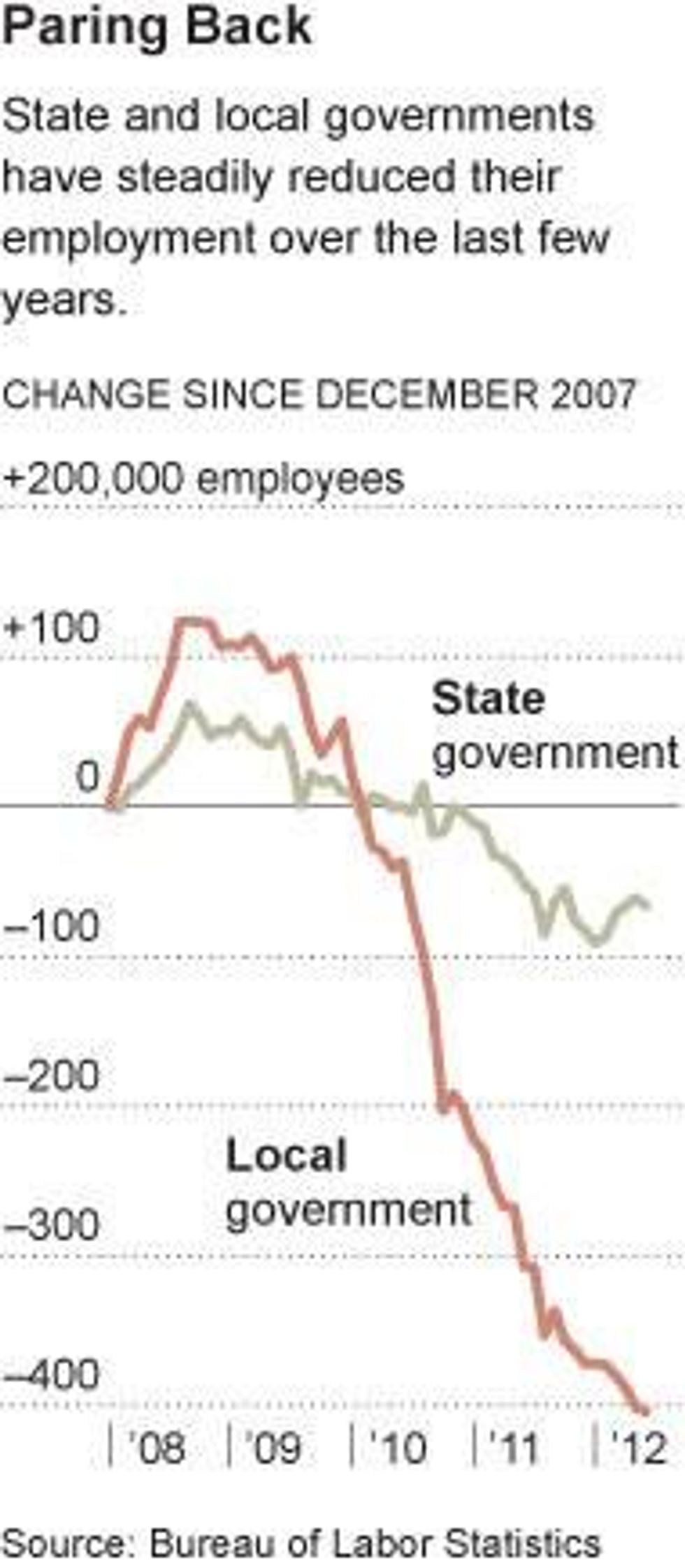If governments still employed the same percentage of the work force as they did in 2009, the unemployment rate would be a percentage point lower, according to an analysis by Moody's Analytics and cited by the New York Times today in an article that describes a US economy unable to heal itself as public sector employment continues unabated.
Whereas the job picture remains bleak in both the private and public sector, it is the local government payrolls that have suffered under the austerity policies of state governments and a US Congress unwilling to offer federal assistance.
Pennsylvania, according the Times report, has shed 5,400 government jobs this year, and many school districts and social service agencies are contemplating more layoffs. "We have slipped to the middle of the pack in terms of job growth," said Mark Price, a labor economist at the Pennsylvania Budget and Policy Center. "And that was driven mainly by the fact that we lost so many jobs in the public sector."
And though the loss of public jobs such as teachers, town administrators, and fire fighters are having an enormous impact on the national economy, these lost employees also have a direct impact on the quality of life in towns and cities and is, in many cases, jeopardizing public safety.
* * *
The New York Times: Public Workers Face New Rash of Layoffs, Hurting Recovery
Companies have been slowly adding workers for more than two years. But pink slips are still going out in a crucial area: government.
in California, the governor is threatening to eliminate 15,000 state jobs. When school begins in Cleveland this fall, more than 500 teachers probably will be out of work. And in Trenton -- which has already cut a third of its police force, hundreds of school district employees and at least 150 other public workers -- the only way the city will forestall the loss of 60 more firefighters is if a federal grant comes through.
Government payrolls grew in the early part of the recovery, largely because of federal stimulus measures. But since its postrecession peak in April 2009 (not counting temporary Census hiring), the public sector has shrunk by 657,000 jobs. The losses appeared to be tapering off earlier this year, but have accelerated for the last three months, creating the single biggest drag on the recovery in many areas. [...]
... those with disappearing jobs say that the effects are not just economic -- they mean longer response times to fires, larger class sizes, and in some cases lawsuits when short-staffed agencies are unable to provide the required services.
After 32 firefighters were laid off in Muncie, Ind., the area that could be reached within eight minutes was cut by half, said Mike Whited, the president of the firefighters union. A federal grant restored 25 workers, but the city does not know if it will be renewed.
Mr. Whited chafed at portrayals of public workers as overpaid or greedy, saying his union and others had made concessions, including paying more for their health insurance and forfeiting raises. "I think a lot of people don't understand what we do," he said. "They're looking for somebody to blame, and I think they're being led the wrong way."
Businesses can also be hindered by government cuts. They not only lose prospective middle-class customers but may face long waits for services. Roland Pott, a real estate broker and developer in Trenton, said that fewer city inspectors adds to construction delays. And the shortage of police officers means he must assuage the safety concerns of prospective tenants. "It makes it harder to lease a space or market a space because people are choosing between Trenton or another area," he said.
Even if the overall economy improves, local governments are likely to lag behind. Property tax receipts, which are projected to fall slightly in 2012, "will be weak through at least fiscal 2014," wrote Daniel White, an economist at Moody's Analytics, in a report this month. "As a result, local government fiscal conditions will remain under pressure."
Jobs in education have accounted for more than half the losses in local governments. Teachers and other school employees continue to receive layoff notices in California, Colorado, Nevada and Ohio, among others. In Los Angeles, about 11,700 teachers and others were notified in the spring. On Saturday, the teachers union ratified an agreement to save more than 4,000 jobs by taking furlough days.
To close a $64 million budget gap, the district in Clark County, Nevada, which encompasses Las Vegas, sent layoff notices to 400 teachers this month and will not fill 600 openings.
In Cleveland, the school district cited a $66 million budget deficit when announcing the layoff of more than 500 teachers this spring. David Quolke, president of the Cleveland Teachers Union, said it followed two years of cutbacks and $25 million in concessions from the union. He said that some classes would have more than 40 children.
Kimili Gulley, 32, has been teaching middle and high school math for nine years and expected her tenure to provide protection. But this month, she too is out of work. "So much emphasis is put on educating kids," she said, "and yet funding is getting cut when it comes to educating kids. So it's kind of hypocritical."
# # #




